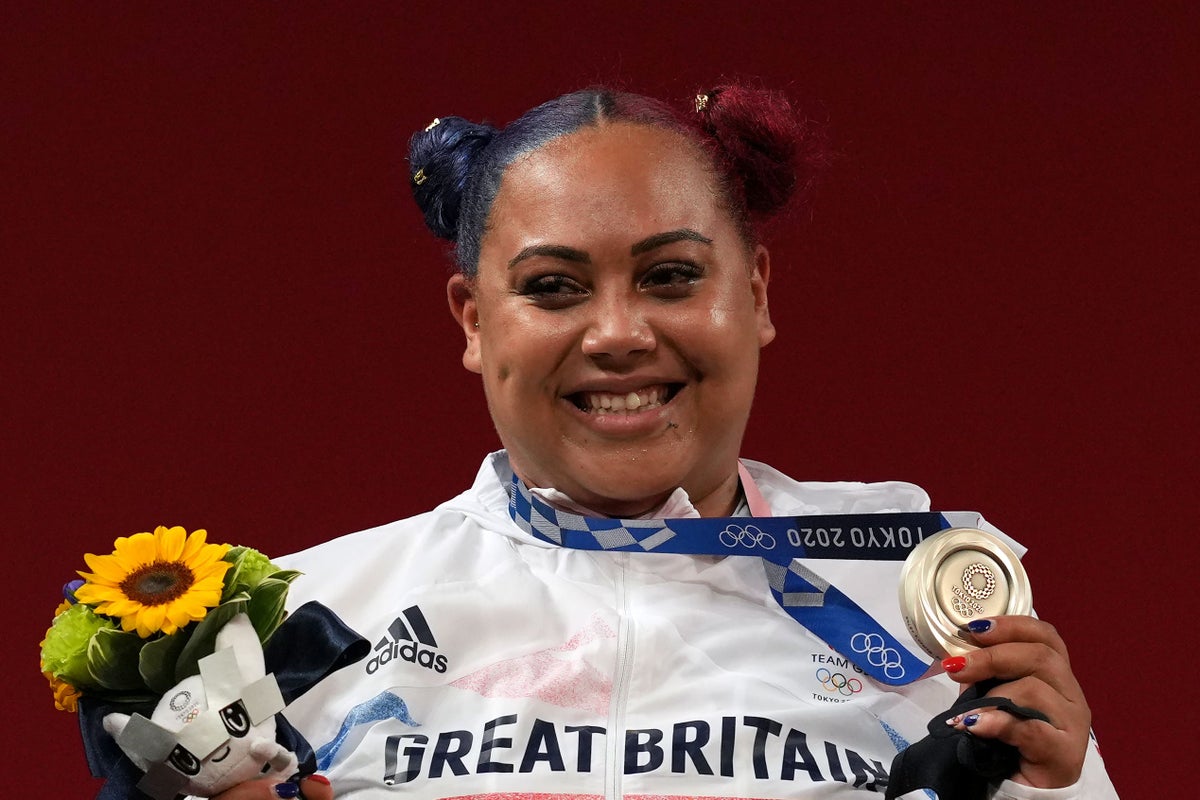
Emily Campbell’s rapidly-expanding medal collection bears testament to the realisation of the “crazy and bonkers” dream she once shared only with her family and a few market traders in her home town of Bulwell, who fuelled her Olympic ambitions with a regular supply of free fruit and veg.
Handsomely repaid for their faith when Campbell returned from Tokyo with an historic silver medal and copious bottles of bubbly, the 29-year-old’s staunchest supporters are now accustomed to news of her trailblazing success in weightlifting competitions across the globe.
Campbell was the first British woman to win an Olympic medal in the sport, an achievement that almost single-handedly shifted its perception, leading to packed stands and back-page headlines when she went on to win Commonwealth Games gold in a raucous National Exhibition Centre in Birmingham last year.
“I always believed that I could do amazing things in the sport, even though people kept telling me that it wasn’t possible,” Campbell, whose hopes of adding another World Championship medal to her collection in Saudi Arabia last week were scuppered by a back injury, told the PA news agency.
“The Olympic medal was me proving that I wasn’t crazy and bonkers, that I could back up the things I’d been saying, that I believed in myself and my team, and it hadn’t been just some sort of pipe dream that we’d been throwing in the air.
“The Olympics was about saying to the world, ‘This is me and this is what I do’. The Commonwealths were about cementing it, proving it wasn’t a fluke that I’d got an Olympic medal, that I won it because I went out there and was good enough to win it.”
Competing in the +87kg super-heavyweight category, Campbell has never sought to disguise the significance of her success in the context of ongoing body image issues among young girls, stressing its importance even before she had her silver medal wrapped around her neck in Tokyo.
She admits she is still moved close to tears by frequent reminders from young girls and their mothers of the impact she has had on shifting those perceptions, and highlighting the opportunities for those who wish to follow less conventional paths to fitness and potential sporting glory.
“My message has always been about changing that narrative that says as women it’s all about our appearance, and that sport and lifting can empower you and help you make decisions in life that are more important than how we look and what we wear and how our hair is and what weight we are,” added Campbell.
My message has always been about changing that narrative that says as women it's all about our appearance, and that sport and lifting can empower you— Emily Campbell
“I appreciate that I can do some good in terms of using my position to inspire people to do whatever makes them happy. I am a private person and I sometimes find the whole celebrity thing a little overwhelming, but I know it is a privilege to be in the position I am in, and I feel like I am helping to make a change.”
Campbell won a silver medal at last year’s World Championships in Colombia and, despite having made a return from planned knee surgery in January, a minor back injury prompted her decision to withdraw from Riyadh and focus on what she calls the “bigger picture” of Paris 2024.
An upgrade to gold will almost certainly prove a lift too far for Campbell, given the dominance in the category of China’s remarkable Li Wenwen, a softly-spoken 23-year-old who routinely totals over 30kg more than her super-heavyweight rivals and is acknowledged, even by the likes of the defiant Campbell, as a class apart.
“She (Li) has a very good aura and energy about her and we are all in awe of her because of what she has managed to achieve at her age,” admitted Campbell. “But it has always been about me and not everybody else.
“I’ve always had a tick-list of things I wanted to do in the sport and my long-term plan was always to get a medal in Paris. I’d only been in the sport for five years when I went to Tokyo, so it did seem unrealistic to plan to win a medal at the first attempt.
“Obviously a few things have changed. I’m accustomed to bringing home some bling now, and I’ve got a bit of a target on my back because the other girls want to beat me.
“But when I come home I still pop down to the market to keep them updated because they were there when I really needed help and support and people to believe in me.
“I still take my boots to the same guy to get mended, and they still look after me with the fruit and veg. (In May) I cut the ribbon to open the new bus station, where I used to get my buses to school or athletics practice. I’m just happy that I’ve helped bring something positive to the place I’m from.”







